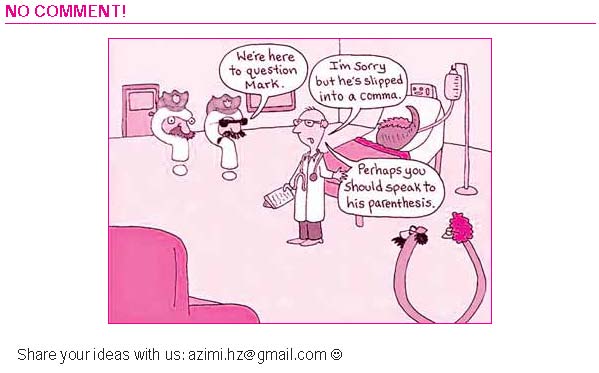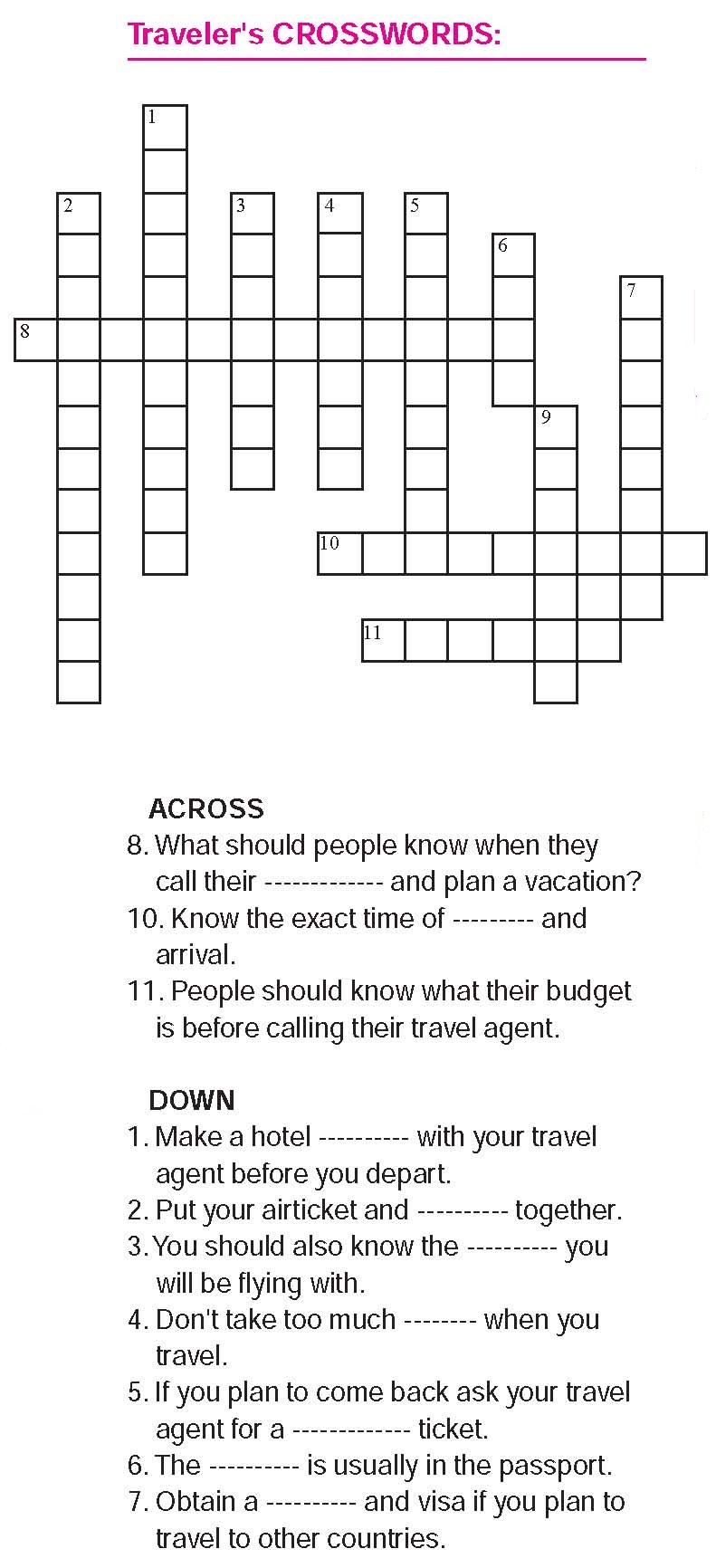PREFACE
Yes! You are awake! We are going to talk about punctuation! We have
rarely read about punctuation, YET it IS a very significant part of writing in
any language. We have all heard of anecdotes emphasizing the role of
punctuation; suffice to say that a simple change of a punctuation mark can
dramatically change its intended meaning! In the present issue of ETFun we
would like to attract your attention to this very important aspect of writing
and also provide you with a couple of tips to teach punctuation in your
classes!
QUOTABLE QUOTES
“I want to change my punctuation. I long for exclamation marks, but I'm
drowning in ellipses.”
― Isaac Marion, Warm Bodies
“Use lots of exclamation points. They love to be overused.”
― S.A.R.K.,
“Punctuation marks are like road signs; without them we just may get
lost...”
― Nanette L. Avery
“Something there is in cyberspace that doesn't love an apostrophe.”
― Mary Norris
“And who would have ever thought we'd see a time when the period – the
building block of our very language, punctuation-wise – would be able to
transform an innocent one-line message into a seemingly threatening or
aggressive imperative? An era when proper punctuation was, potentially,
terrifying?”
― Emmy Favilla
NO COMMENT!

Share your ideas with us: azimi.hz@gmail.com
Teaching tips: How to Teach Punctuation Skills: FIVE Best
Practices
How to Teach Punctuation Skills: FIVE Best Practices
- “Mom, what’s a semi-colon for?” my daughter asked me recently.” She
was working on a school essay.
- “Well, can you show me where you’d like to use it?” I asked.
- “But what is it?”
- “It’s a dot on top and comma below.”
- “No, I mean, what’s it for?”
- “You need to show me where you’d like to use it….” and so on.
This kind of conversation is typical when talking about punctuation. It
highlights why it’s so difficult to teach and learn correct punctuation: it’s
near impossible to teach outside of the context of written text, and it is full
of difficult terminology (independent clause, dependent clause, introductory
phrase, etc.) foreign to most learners. However, there are several methods a
teacher can rely on to teach punctuation and sharpen students’ grammar skills
at the same time.
5 Best Practices for Teaching Punctuation
Recognize and debunk punctuation “rules” students might already
“know.”
A period goes at the end of a thought. A comma marks a “breath.” A colon
is stronger than a comma but not quite as strong as a period…and so on. “Rules”
of punctuation are filled with such myths and elements impossible to measure as
“thoughts” and “breaths” and “strong” and “weak,” probably because at some
point in students’ education it was easier to talk about breaths and thoughts
than about independent and dependent clauses and coordinating conjunctions,
which is really how punctuation is actually used.
Teach related grammar and sentence variety.
It’s not possible to teach punctuation without teaching independent and
dependent clauses and coordinating and subordinating conjunctions, as it is
these grammatical elements that punctuation actually marks—a period
demonstrates the end of an independent clause, or simple sentence, for
example—so teaching punctuation is also a good opportunity to review sentence
construction and variety. For example, one exercise I like to use is after
teaching some of the basic rules of punctuation use, giving students a passage
from a well-known story, with all the complex and compound sentences changed to
simple sentences. For example, one of the opening paragraphs of F. S.
Fitzgerald’s The Great Gatsby goes from “The practical thing was to find rooms
in the city, but it was a warm season, and I had just left a country of wide
lawns and friendly trees, so when a young man at the office suggested that we
take a house together in a commuting town, it sounded like a great idea….” to
“The practical thing was to find rooms in the city. It was a warm season. I had
just left a country of wide lawns and friendly trees. A young man at the office
suggested that we take a house together in a commuting town. It sounded like a
great idea.” Give students the revised version without showing the original,
discuss why it is ineffective -e.g., the causal relationships have all been
deleted- and see if they can work to combine sentences and improve the passage.
Then have them compare their revisions with their original by Fitzgerald.
Teach punctuation and grammar as an end of the process, not an end in
itself.
I emphasize to my students that correct grammar, usage, and punctuation
are not ends in themselves—they are not the purpose of written
communication—rather they are part of the means of communicating a message. For
example, the reader of the revised Fitzgerald passage above is likely to have
trouble seeing the relationship between having just left a rural area and the
decision to take a house outside of the city because the coordination and
subordination, and their related punctuation, have been removed, causing a gap
in communication. Knowing how to vary sentences with standard punctuation helps
assist the reader in understanding the message, in other words.
Teach in context.
One of the reasons I use classic and contemporary passages like “The
Great Gatsby” is that it’s very difficult to talk about grammar and punctuation
without placing it in some kind of context, which is why it was hard to answer
my daughter when she asked, “What is a semi-colon for?” I could have answered
“It’s used to connect two independent clauses, and also to connect two independent
clauses with a coordinating phrase…” which, I suspect, would mean little to
her. That is why I asked to see her paper, to show her how she would use the
semi-colon in the context of the ideas she was trying to communicate. Most
importantly, however, the student should be told to not worry very much about
semi-colons in the first draft, as she is just getting her ideas down at this
point, and the sentences are likely to change in any case in later drafts.
Relate punctuation to editing and proofreading.
Finally, punctuation really should be related to that final stage of
writing: the editing, proofreading, and polishing that go on after all the
ideas are arranged on the paper in coherent sentences. It is at this point that
the student can look critically at a paper and make decisions about where a
simple or a more complex sentence would be more effective, or whether to
connect two independent clauses with a semi-colon or with a conjunction and
period. That this stage of editing comes last does not make it of lesser
importance, of course—it is Fitzgerald’s masterful use of sentence structure
and variety, for example, that in part distinguishes him from lesser writers.
However, correct punctuation is not the end goal of writing itself, and
it should be taught in the context of communicating a message with authority to
a reader.
JOKES
1
Little Johnny: Teacher, can I go to the bathroom?
Teacher: Little Johnny, MAY I go to the bathroom?
Little Johnny: But I asked first!
2
Teacher: Why are you late?
Student: There was a man who lost a hundred dollar bill.
Teacher: That's nice. Were you helping him look for it?
Student: No. I was standing on it.
3
Customer: Excuse me, but I saw your thumb in my soup when you were
carrying it.
Waitress: Oh, that's okay. The soup isn't hot.
4
The real estate agent says, "I have a good, cheap apartment for
you."
The man replys, "By the week or by the month?"
The agent answers, "By the garbage dump.."
5
Bank Teller: How do you like the money?
English Student: I like it very much.
FUNNY RIDDLES
1. What walks all day on its head?
2. What gets wet when drying?
3. What is that you will break even when you name it?
4. What belongs to you but others use it more than you do?
5. What is it the more you take away the larger it becomes?
(Check below for the answers.)
Traveler's CROSSWORDS:

ACROSS
8. What should people know when they call their ------------- and plan a
vacation?
10. Know the exact time of --------- and arrival.
11. People should know what their budget is before calling their travel
agent.
DOWN
1. Make a hotel ---------- with your travel agent before you depart.
2. Put your airticket and ---------- together.
3. You should also know the ---------- you will be flying with.
4. Don't take too much -------- when you travel.
5. If you plan to come back ask your travel agent for a -------------
ticket.
6. The ---------- is usually in the passport.
7. Obtain a ---------- and visa if you plan to travel to other
countries.
9. Know what the ---------- is going to be like, so you can take the
right clothes.